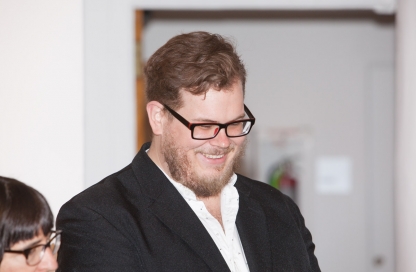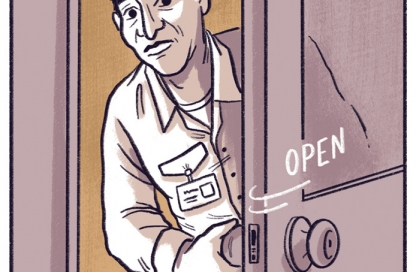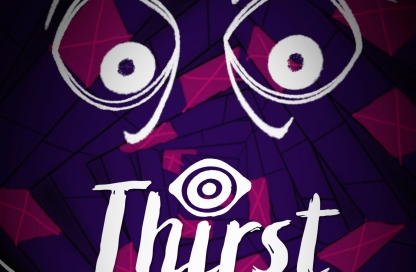Thomas Slattery talks about his interactive story, ‘Aura’
Thomas Slattery (Class of 2017) is an illustrator, cartoonist, storyboard artist and, as of his latest project, a VR game storyteller! We asked him a few questions about Aura, his thesis project for MFAVN. Keep your eyes open for our thesis show, coming July 2017.

Aura looks like an ambitious project. The clips you’ve shown so far are wonderful! Tell us about Aura and how it became your thesis project.
I wanted to use my thesis project to explore storytelling in media that I hadn’t used before. There’s a very full story behind Aura, but as a former set dresser and having always had a love for set design I wanted to work in a way that uses environment to tell a story. My dream was for the thesis to be an installation, but both a love of gaming and a need to keep the project practical led me to creating a VR experience.
What is it about your story that needed VR? Can you tell us without giving anything away?
VR, to me, feels like something a person does alone. I know you could virtually meet up with people and interact in a VR space, but in the physical world you’re sitting with goggles on your head, cut off from the world. My story grew out of this idea of technology making people feel isolated and the longing that comes from that, so I think making the story for VR was almost a poetic way of telling this particular story.
Tell us a little bit about the story itself.
I based the story around a scientist, Theo Aphasian, whose life experiences combined with the feeling of technology fueled isolation fuel this philosophy that people are evolving into solitary creatures – distancing ourselves from social needs. Essentially he develops technology that uses brainwave entrainment to wean people off of codependence. The tech gets really advanced, branching into mind control, manipulation, and hallucination, resulting in a disaster caused by the mishandling of the tech by a mysterious third party.
So this story is told by the player exploring the lab where said disaster took place. You get to know Theo through the detritus in the lab, uncover the personal conflicts between his work and his inner life and get the larger story of his work, the lab and the therapy.
That does sound juicy for VR! How did you approach crafting this story in VR? The tech must provide some limitations and benefits.
I found the biggest limitation to be first person storytelling. One of the goals was getting narrative across strictly through environment, but then I was left with the player as a character, so designing the arc for the player and figuring out how much character should be assigned was a problem to solve. Aside from that it was a matter of self control, in virtual space anything is possible so it was kind of a task to stay grounded for the sake of the experience!

Do you feel the technology dictated a lot of the story then? Was there a point where its potential and limitations were more powerful than what you wanted to do? Every medium helps guide the story one way or another, but I’m curious just how deeply this medium rears its head while you’re trying to create.
I’ll admit that most of the limitations for this project came from my own prior inexperience. I had to figure out some workarounds and change some planned interactions when the code I was using turned against me or didn’t do what I’d intended. So on that level there was a lot of problem solving- how do I get this story best in their with the resources I have? I think in some ways not getting what I wanted helped the whole thing. I’d originally scripted several cut scenes and animations that ultimately would have created a bloated, disjointed experience. Being forced to streamline ended up being an asset.
I think it’s safe to say that almost everyone working in VR or experiential storytelling is inexperienced. It strikes me that what is “elegant” in storytelling may stay consistent, even as we enter the VR era. What do you hope your audience will get from Aura?
The most important thing is the story and showing that this medium has the potential for well written narrative. But at the end of the day I think I ended up working in VR to prove to myself that I can tackle stories across media – so in a way I want to show my own versatility with storytelling and writing for any visual media. So I’m hoping the audience walks away feeling like they got to take in a powerful narrative in a way that serviced the story, and that they’ll remember the emotional impact as well as the novelty of the medium.


